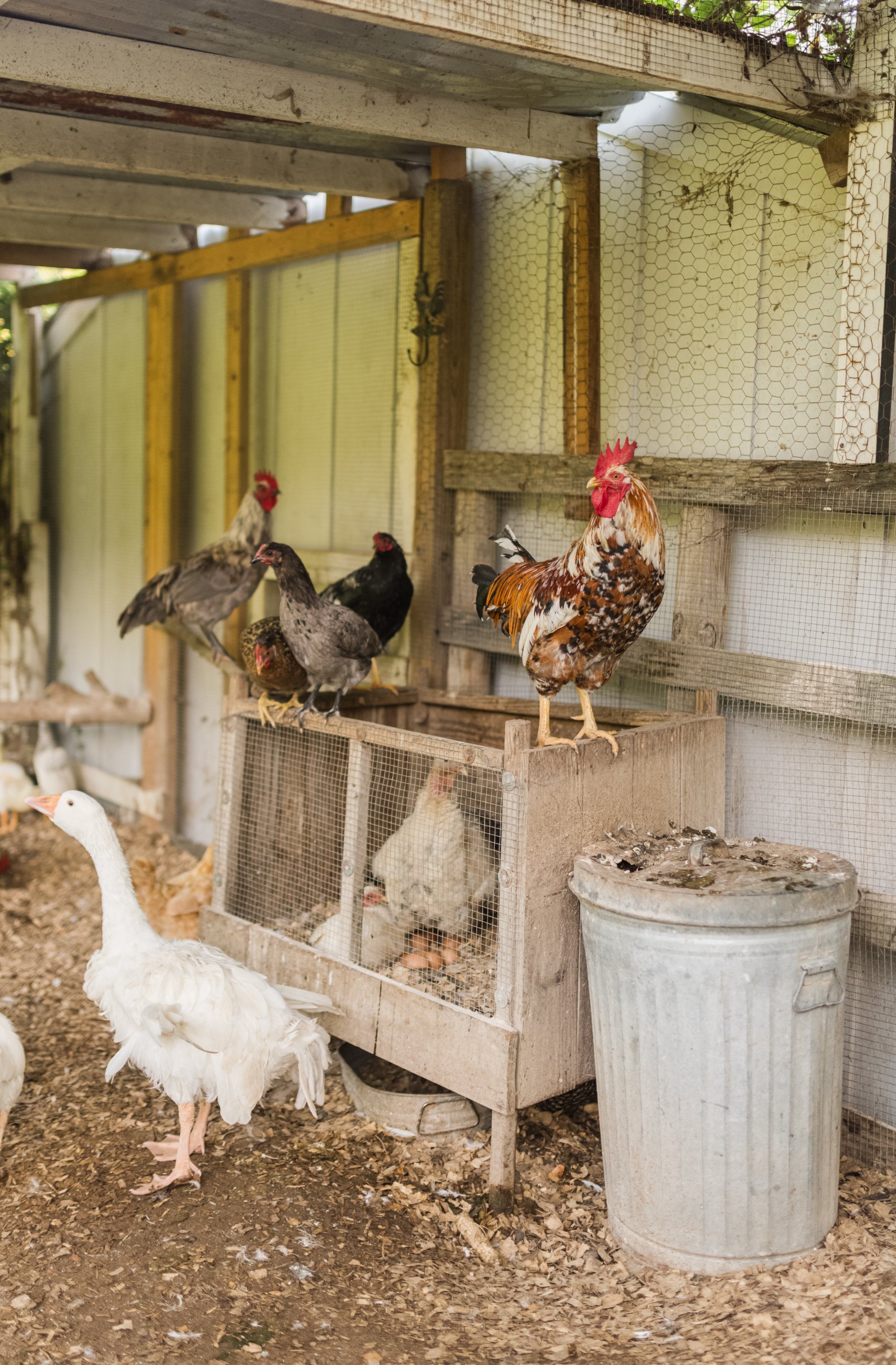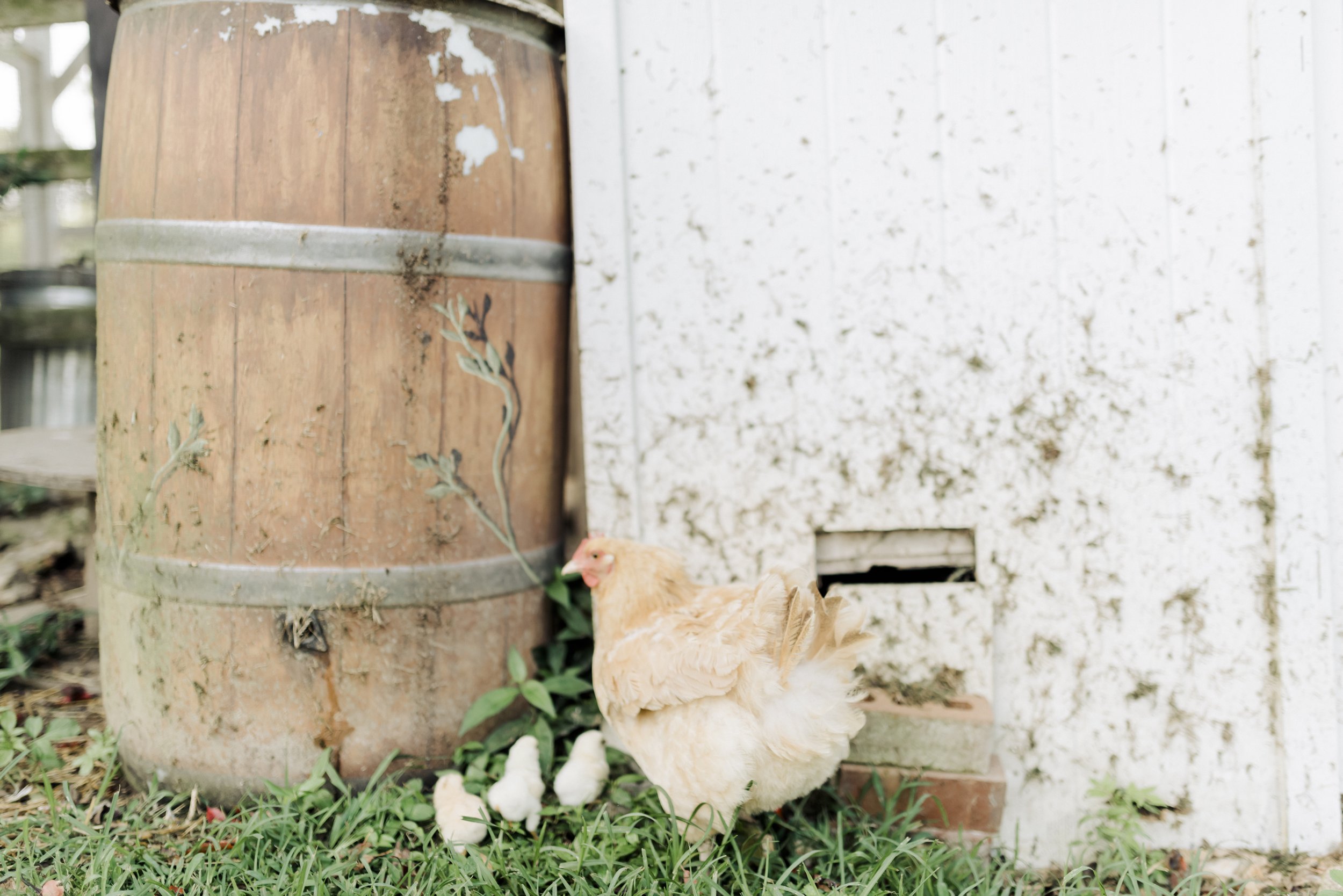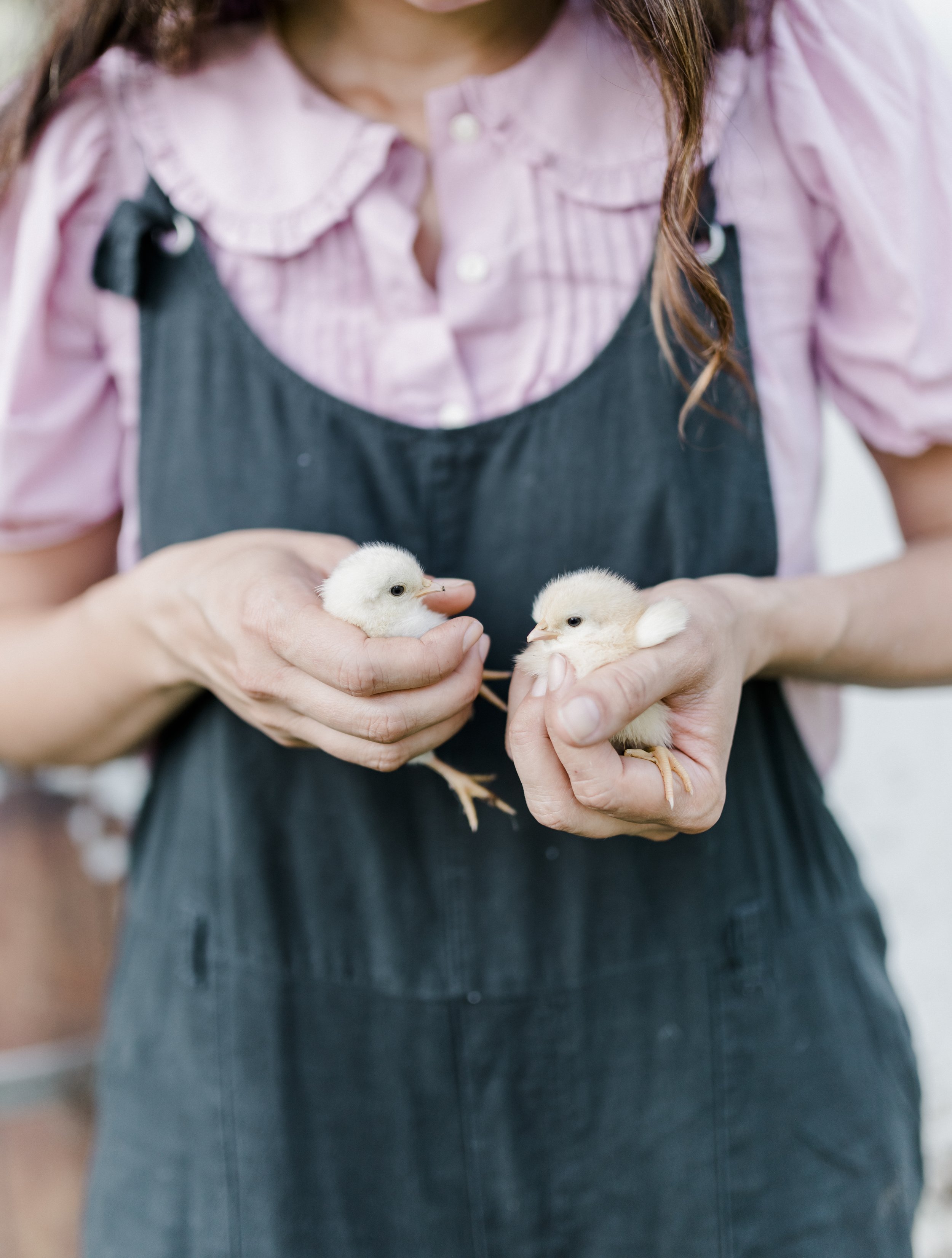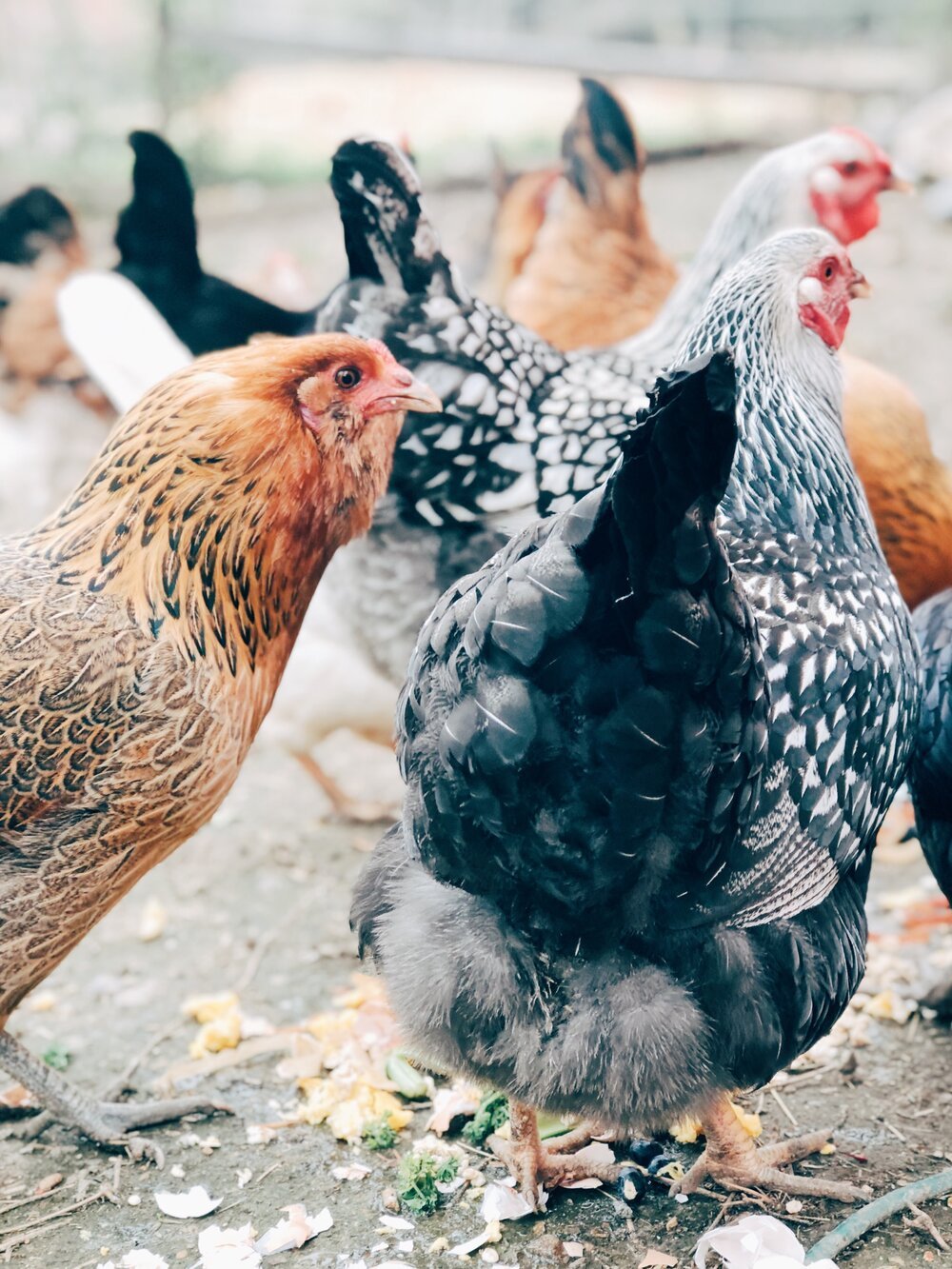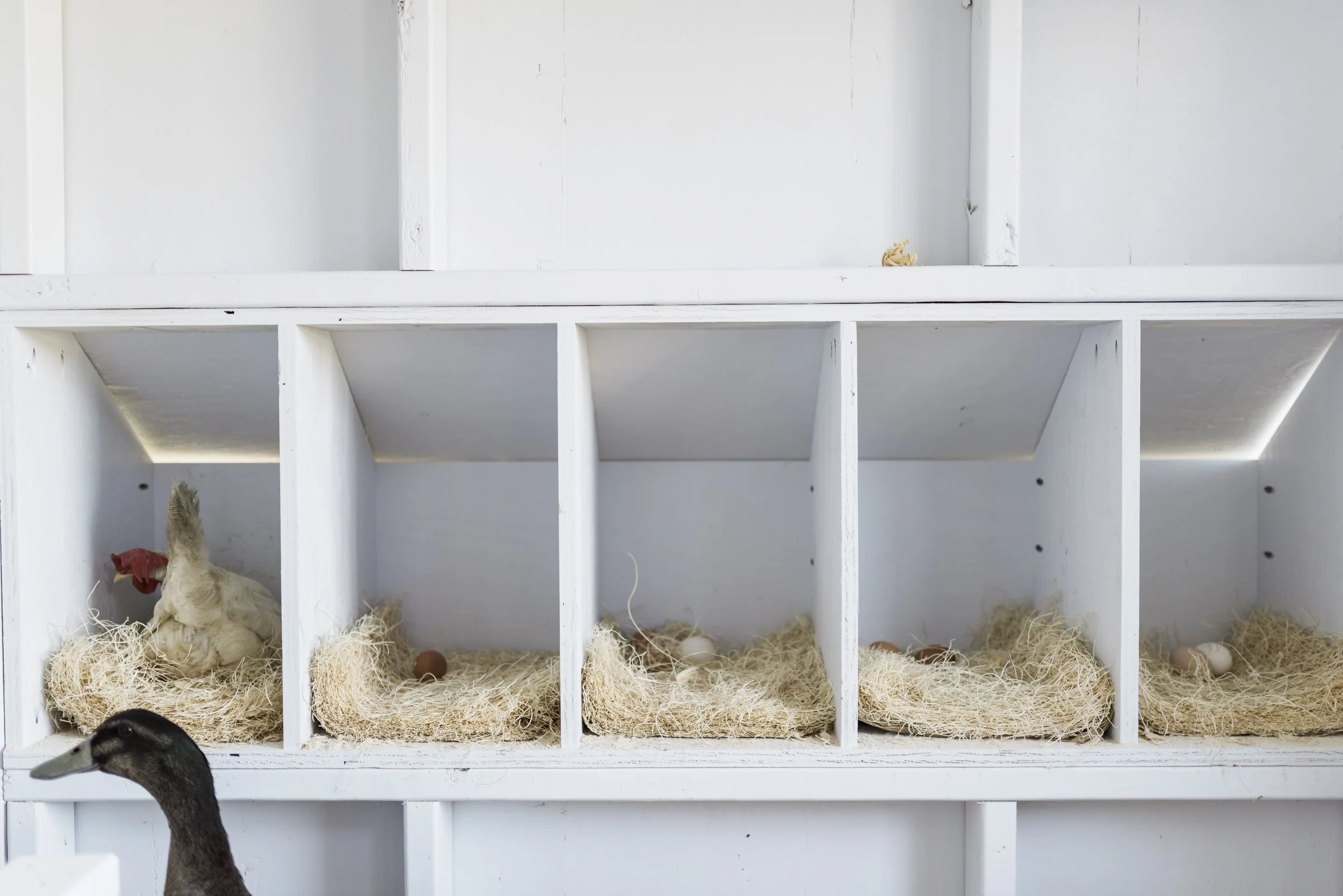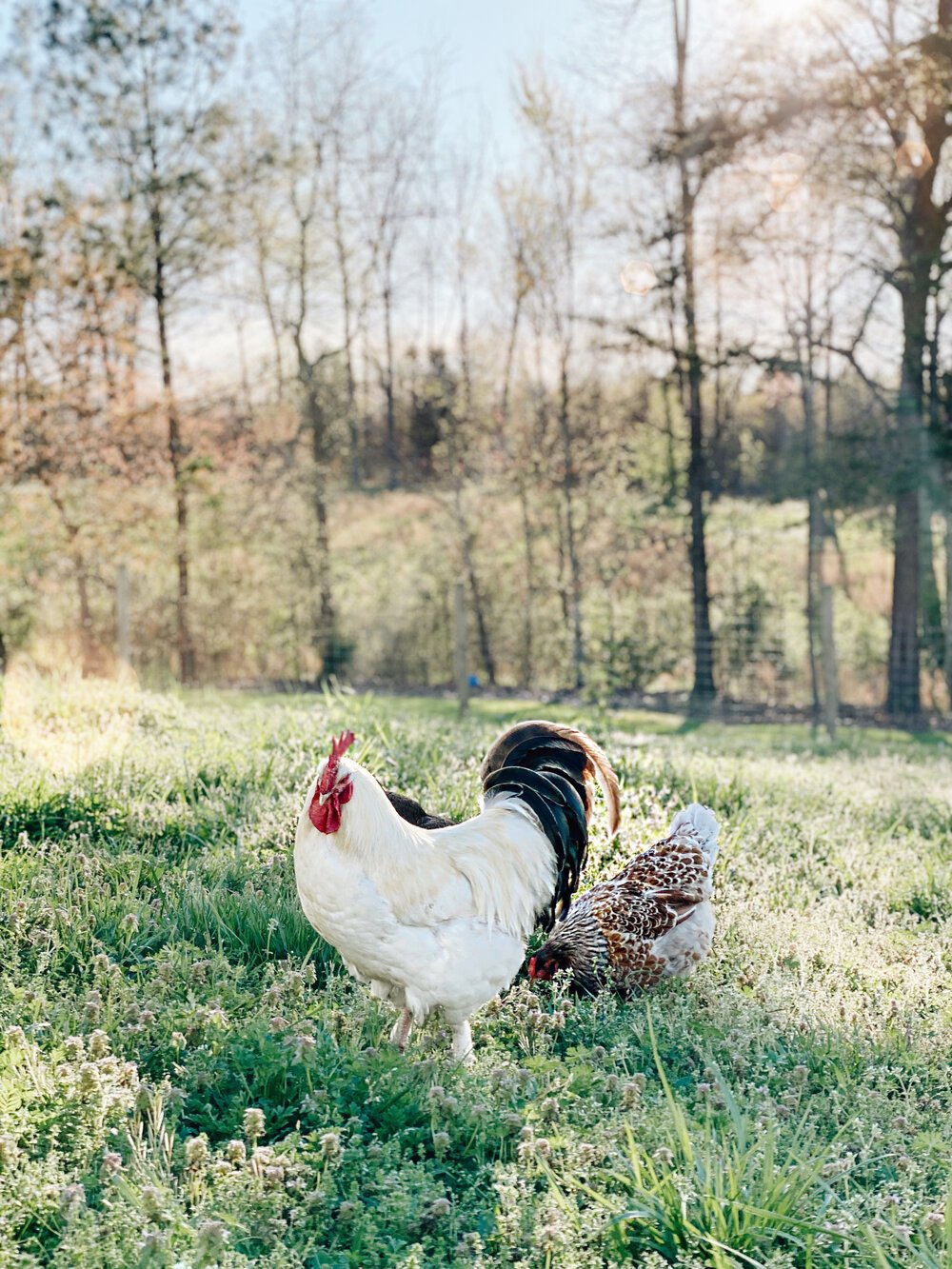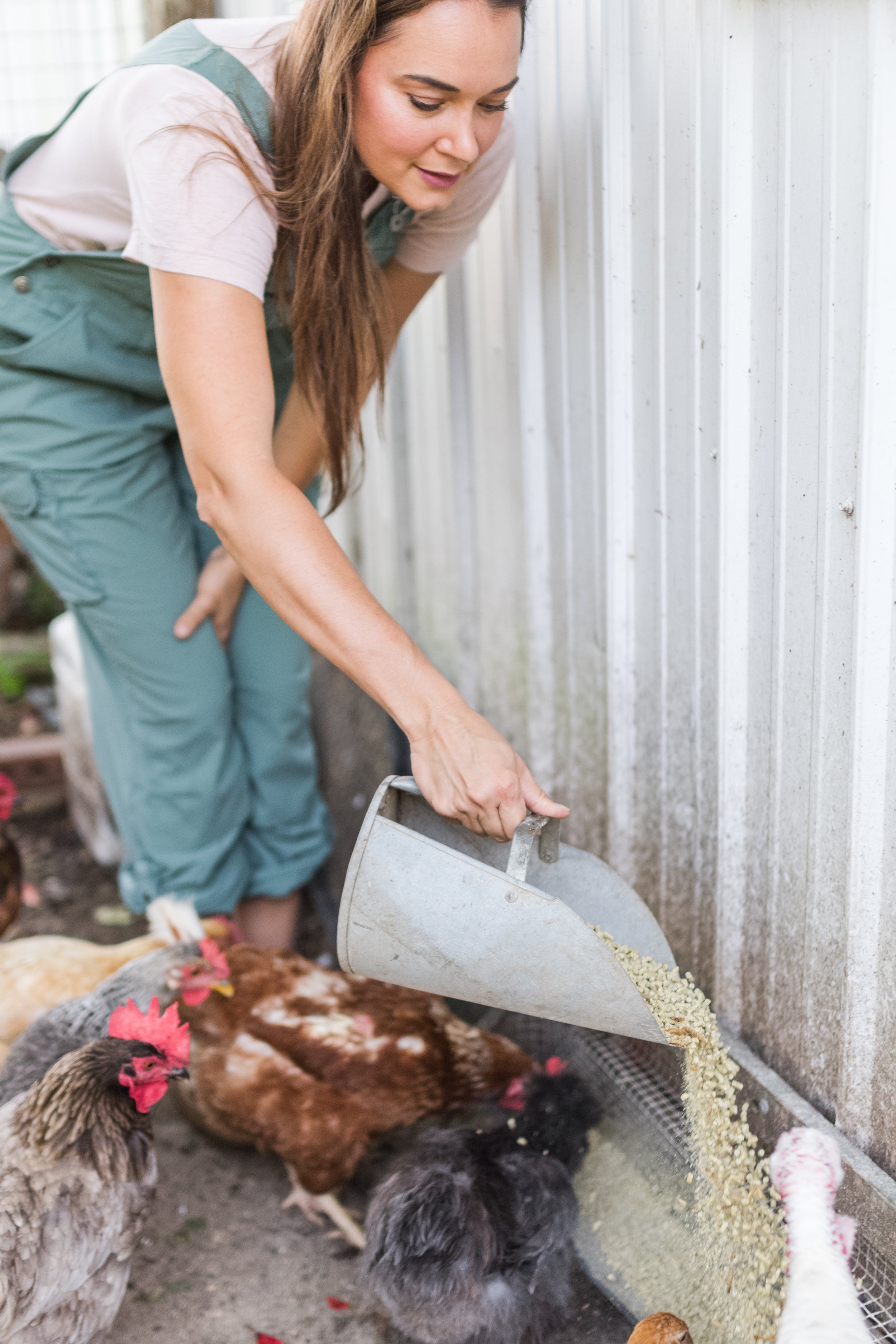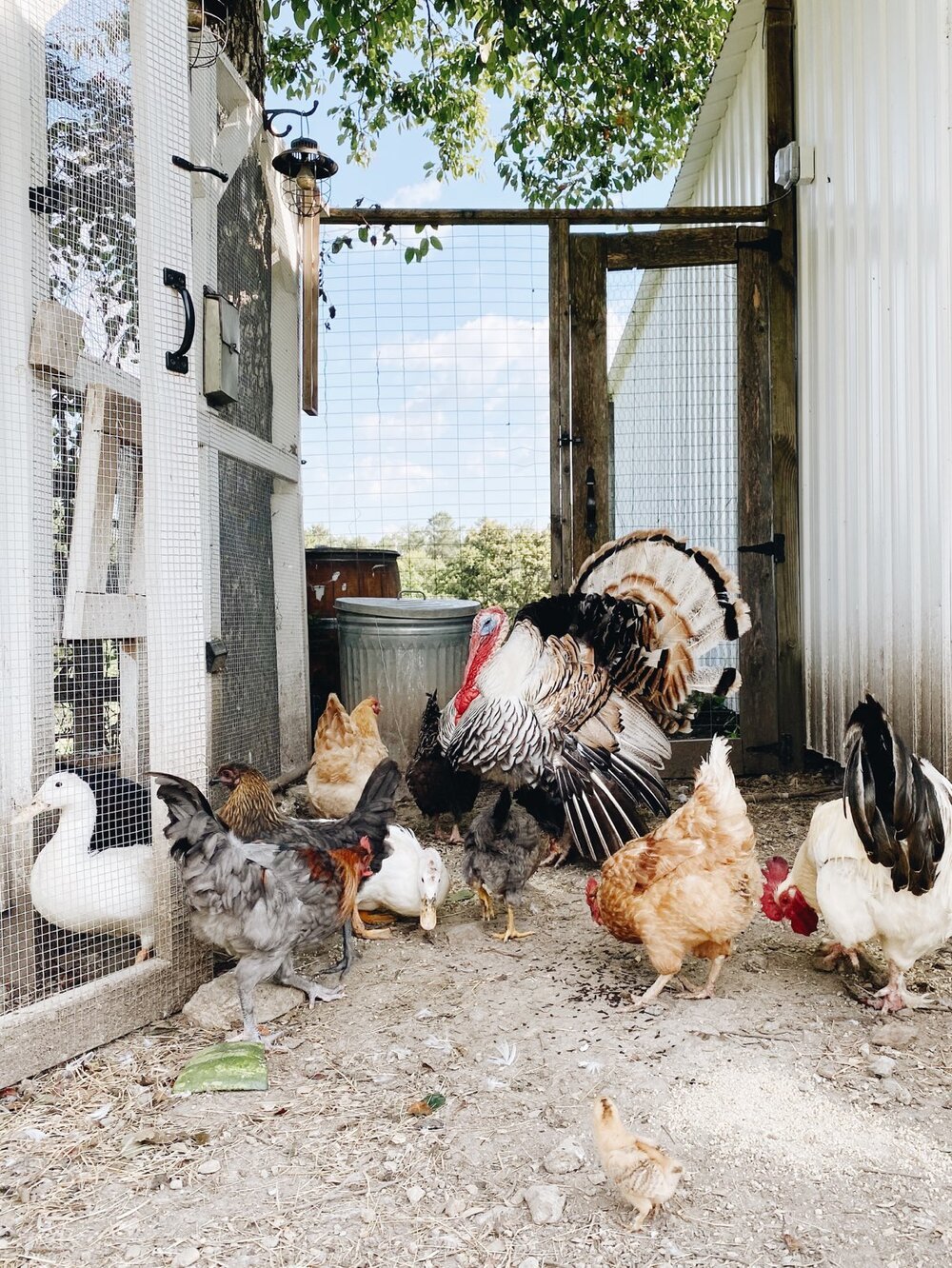How To Care For Chickens - A Beginner’s Guide To Happy Chickens!
When we moved to our homestead, chickens were the first animals we had on the farm. Boy, they sure are entertaining pets to have (like all our other animals!) They have been such a blessing in our lives and provide lots of enjoyment to our family. I cannot imagine life here on the farm without them.
Keeping chickens is rewarding, therapeutic, fun, and sometimes nerve-wracking if you are a newbie! There is tons of web info, and it can seem overwhelming.
I want to keep it as simple as possible for you, so this guide will cover all the basics you need to know on how to raise chickens as a beginner and reap all the incredible benefits!
Let's dive (fly?) in below!
CONTENTS:
How to care for chickens
First of all, ask yourself the following questions:
Why do you want to raise chickens? For meat, their eggs, or pleasure?
Are you prepared to attend to them daily? It requires some effort!
Where will you keep them, and where will they roam and sleep?
Who will look after them when you are not available?
When you know the answers, it will make planning, decision-making, and commitment easier. Like any other animal or pet, raising chickens requires hard work, discipline, and routine.
If you aren't able to properly care for them, maybe you should reconsider?
If you are ready, that's fantastic news, and I am so excited for you! You'll love it!
Raising Baby Chicks 101
For a beginner, starting your flock with baby chicks is best. Hatching eggs (fertilized eggs that need to be incubated) may be daunting at first.
You can get chicks from your local farmer, hatchery, or order through the mail from companies such as Tractor Supply. These companies will usually send you healthy chicks. However, avoid chicks that look lethargic, hunched in a ball, reluctant to move, or have eye/nose discharge when you choose them yourself.
For my complete guide on how to raise baby chicks, including brooder requirements, week-by-week care tips until 16 weeks, and feed needs, read this blog:
I also compared the differences between when you raise the chicks and when a hen raises her chicks. There are a few extras you need to know and do as opposed to when mother nature takes its course.
Caring for Chickens 101
As I mentioned, caring for chickens requires some planning, work, and ongoing commitment. But, if you got this far, I assume you are an animal lover like me and want the best for your flock!
The great thing is that caring for chickens is easy when you have a daily routine and stick to a schedule doing all the necessary tasks.
You won't be running around like a headless chicken.
Coop,Shelter, And Space Needs
Chickens need a safe place to rest, lay eggs, hide from danger and predators, and be guarded against weather elements.
Before getting your chicks, ensure you have a coop or shelter. It may take up to 12 weeks before moving them from the brooder to outside but be prepared.
The coop must be weatherproof; a wet chicken is not a happy chicken!
It also needs to be big enough so there is enough space for everyone. This will prevent squabbling and overcrowding that can lead to unsanitary and unhealthy conditions. The minimum suggestion is 2-3 square feet per chicken inside a coop.
Good ventilation is essential! The coop needs to be cool in the summer and warm in the winter but not stuffy and damp. When there is not enough ventilation, it can once again lead to unhealthy conditions, mold issues, and illnesses.
It's also essential to clean your coop about once a month. Read more here: Cleaning your chicken coop
Your hens need nesting boxes where they can lay their eggs. One box for every three hens is recommended, but the more, the better.
Lastly, they need a safe outside run/pen as chickens often sleep outside, so they will still be protected against predators.
READ MORE:
What should be inside a chicken coop - The essentials to make your flock’s house a home
let chickens free range
I am an avid believer that chickens must be able to range around freely during the day. Benefits of letting them free range include:
They will roam around all day in search of any bugs and critters. This helps hugely with keeping the barn and surrounding areas disease-free. They also help keep flies away as they peck around in the animal manure, eating larvae.
Your eggs can be more nutrient-dense due to naturally foraged items.
They need less store-bought grit because they pick up natural grit like sand, pebbles, and stone, helping them break down food without teeth.
Chickens are healthier and happier when they are free-range. With all the roaming around, it helps to keep the weight down. Illnesses are also contained easier this way than in a coop setting where they are close to each other.
What do chickens eat?
Chickens are omnivorous birds, which means they have a diverse diet that includes a variety of foods. A well-balanced diet is crucial for their health, egg production, and overall well-being. What you feed your chickens will significantly impact their health and egg production.
Correct feed = healthy chickens and eggs.
Poor feed = over/underweight chickens, illnesses, poor egg quality.
A good chicken feed will include amino acids, vitamins, minerals, enzymes, fiber, and quality protein. Chickens' protein needs and feed type will differ according to their age.
Here's an overview of what chickens eat:
Commercial Chicken Feed:
Starter Feed (0-6 weeks): This high-protein feed helps young chicks grow and develop properly.
Grower Feed (6-18 weeks): Lower in protein than starter feed, this feed supports steady growth.
Layer Feed (18 weeks and up): Contains essential nutrients for egg production, including calcium for strong eggshells.
Broiler Feed (for meat birds): Specifically formulated for chickens raised for meat, providing balanced nutrition for rapid growth.
Scratch Grains
Whole grains like corn, barley, oats, and wheat can be scattered on the ground as a treat or supplement. Scratch grains are energy-rich and can help keep chick ens warm in colder weather.
Apart from this, I occasionally give them some treats, because why not??
Kitchen Scraps and Leftovers
Many kitchen scraps are safe for chickens, including fruit and vegetable peels, cooked rice, pasta, bread (in moderation), and non-citrus fruits.
Vegetables
Fresh vegetables like lettuce, kale, spinach, carrots, and cucumbers are excellent sources of vitamins and minerals.
Fruits
Chickens enjoy fruits like apples, berries, watermelon, and melon. Avoid giving them citrus fruits or pits from fruits.
Protein Sources
Insects, bugs, and worms are natural sources of protein for chickens. They love scratching and foraging for insects in the yard. Mealworms and earthworms can be provided as treats or supplements.
Greens
Chickens relish leafy greens such as lettuce, cabbage, and kale. Greens provide fiber and nutrients.
Calcium Supplements
Crushed oyster shells or eggshells can provide extra calcium, promoting strong eggshell formation.
Avoid These Foods
Chocolate, avocados, onions, garlic, citrus fruits, and highly processed or salty foods should be avoided, as they can harm chickens.
Read more: A complete guide on foods NOT to feed chickens and ducks
Grit
You must also add grit to their feed to help with digestion and oyster shells to keep their bones and eggshells strong.
And, of course, always have fresh, clean water available. A hen can easily drink, on average, 1 cup of water per day.
Remember that a balanced diet is crucial. While treats and scraps are enjoyable for chickens, they should not make up more than 10% of their overall diet.
Providing a commercial feed formulated for their specific life stage is essential to ensure they receive the necessary nutrients for growth, egg production, and overall health.
HERE is a printable guide on what to feed and not to feed your flock.
Health and Wellness
Ensuring the well-being of your chickens is crucial for them as well as your enjoyment as a chicken keeper. Maintaining their health and wellness requires vigilance, proactive care, and an understanding of potential health concerns.
Common Health Concerns
Parasites
External and internal parasites can cause discomfort, disease, and reduced egg production. Regularly inspect your chickens for signs of mites, lice, and worms. Symptoms may include feather loss, weight loss, lethargy, and pale combs.
Dust baths (oh how they love those!) and regularly cleaning the coop will help keep parasites down. I often spray all coop surfaces, nesting boxes, and even the chickens with my all-natural homemade mite and coop spray. Here is the recipe.
Bumblefoot
Bumblefoot is a staph infection where bacteria has entered the chicken's foot through a cut or scrape. It starts with an infection in the foot or toes but can travel up the leg and be fatal if it spreads to other tissue & bones.
Signs that you need to look out for include limping and a puffy, swollen foot or toe, and sometimes even legs if the infection is severe. The most tell-tale sign would be a black scab where the infection is.
Read more: Bumblefoot in chickens: How to treat it naturally and surgically.
Respiratory Issues
Respiratory infections can spread quickly among chickens. Watch for signs like coughing, sneezing, wheezing, nasal discharge, and labored breathing.
Good ventilation, clean bedding, and avoiding overcrowding can help prevent respiratory ailments. Quarantine new chickens before introducing them to the flock to minimize disease transmission.
Digestive Problems
Chickens can experience digestive issues like impacted crops, sour crop, and egg-binding. Observe your chickens for signs of discomfort, difficulty swallowing, or unusual behaviors. Providing access to grit, offering probiotics, and ensuring a balanced diet can aid in preventing and managing these concerns.
Heat Stress and Cold Exposure
Extreme weather conditions can impact your chickens' health. Heat stress in summer and cold exposure in winter can lead to distress and even death. Ensure your coop is well-ventilated and insulated, provide shade and water in hot weather, and safeguard against frostbite during colder months.
Egg-Related Problems
Abnormalities in egg production can indicate health issues. Vitamin deficiencies, parasites and infections, and stress can affect egg production or quality. Pay attention to eggshell quality, size, color, and the presence of blood spots. Offering oyster shells and maintaining a nutritious diet can help prevent eggshell issues.
Behavioral Changes
Changes in behavior, such as lethargy, isolation, or aggression, may signal underlying health problems. Monitor your chickens' interactions and activities to detect any deviations from their usual patterns.
WAYS to keep your FLOCK happy and well
Clean and Comfortable Coop
A clean and well-maintained coop is essential for chicken health. Regularly clean bedding, remove waste, and ensure proper ventilation to prevent mold and disease.
Nutritious Diet
Provide a balanced diet with appropriate protein levels for each growth stage. Offer fresh water, grit, and oyster shells to support digestion and strong eggshells. Avoid feeding them moldy or spoiled food.
Hygiene Practices
Wash your hands before and after handling chickens to prevent disease transmission. Quarantine new birds before introducing them to the flock to avoid potential infections.
Space and Enrichment
Avoid overcrowding by providing ample space for your chickens to move and roost comfortably. Enrich their environment with perches, nesting boxes, and items for pecking and scratching.
Natural Foraging
Encourage free-ranging daily to allow your chickens to forage for insects, plants, and natural grit. This enriches their diet and promotes their physical and mental well-being.
Regular Health Checks
Conduct routine health checks to detect early signs of illness. Inspect feathers, combs, eyes, and behavior regularly to catch potential issues before they escalate.
Veterinary Care
Establish a relationship with a poultry-savvy veterinarian who can provide guidance, vaccinations, and treatment when necessary.
They do best in a flock
Chickens are social animals with a strong instinct to live in flocks. They establish hierarchies and engage in social behaviors, such as dust bathing and foraging, which are enriched when they have companions. A single chicken may experience loneliness, stress, and boredom without the company of other chickens.
Chickens for the win!
I hope this guide on how to care for chickens has been of great help to you! I promise you, when you get the hang of it, keeping chickens is a breeze and such a joy!
I think you’ll find these blogs very helpful too:
How to choose backyard chicken breeds
My thoughts on keeping roosters.
Raising a mixed flock? Yes, it is possible!
Broody hens - Tips and what to expect
Love, Annette xx
PIN FOR LATER

